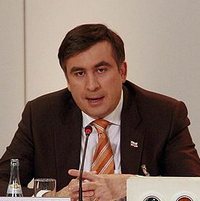Ever since the 2003 Rose Revolution, Georgia has painstakingly cultivated its image as an emerging-market investor's dream and a lonely bastion of Western-style modernity in the South Caucasus. But that image faces a credibility problem in light of Tbilisi's continuing lack of political progress toward a truly liberal democracy. By allowing Georgia's democratic development to remain at a standstill, President Mikheil Saakashvili risks damaging the country's legitimacy, both domestically and with its partners in the West.
When Georgian opposition leader and former Saakashvili ally Nino Burjanadze and her supporters took to Tbilisi's streets in May, the protestors' rhetoric was rife with references to the wave of uprisings that had shaken and unseated authoritarian governments across the Arab world. The May protests did not result in revolution, but what they lacked in scale they made up for in drama. On May 26, a hardcore group of protestors refused to vacate their position outside the Georgian parliament building after their permit expired, culminating in a showdown with police that saw dozens beaten or arrested and two killed. While international representatives and rights watchdog groups condemned the police violence as disproportionate, the Georgian government dismissed the protesters as a Kremlin-aligned "fifth column."
Burjanadze's openly pro-Moscow posturing and career of textbook political opportunism suggests that there is probably some truth to the government's charge. But the government's diminishing restraint toward its opponents is hardening the perception that Georgia's ruling elite have no intention of incubating a genuine democratic system.

